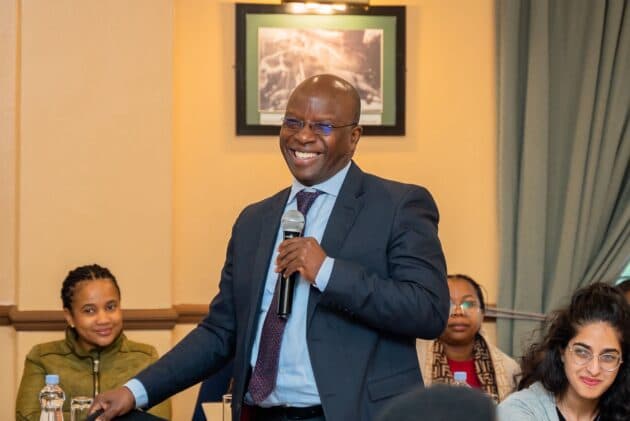We're loading the full news article for you. This includes the article content, images, author information, and related articles.
From humble beginnings and personal reflection, his faith and professional drive have led him to become a leading consultant obstetrician-gynaecologist, lecturer, fertility specialist, and president of professional societies.

Nairobi, Kenya — September 23, 2025, 21:00 EAT.
Dr. Frederick Kireki Omanwa is a name that now resonates in medical, academic, and reproductive health circles in Kenya. From humble beginnings and personal reflection, his faith and professional drive have led him to become a leading consultant obstetrician-gynaecologist, lecturer, fertility specialist, and president of professional societies.
Dr. Omanwa serves as a Consultant Obstetrician & Gynaecologist with a subspecialty in Reproductive Endocrinology and Fertility. He is also a senior lecturer at the University of Nairobi.
He is the current President of the Kenya Obstetrical and Gynaecological Society (KOGS).
His academic credentials include an MD (Wrocław), PhD (Wrocław), and training through the UK (RCOG) in Reproductive Endocrinology.
Kenya continues to wrestle with issues of infertility, maternal health, fibroids, and gender-based reproductive challenges. Specialists like Dr. Omanwa play key roles not just in care delivery, but also in public education, research, and shaping policy around women’s health.
Dr. Omanwa’s path is emblematic of many Kenyan medical professionals who combine faith or personal motivators (“prayers”) with rigorous training (“purpose”) to address high unmet health needs.
The Kenyan health regulatory framework (Medical Practitioners and Dentists Board; licensing, hospital accreditation) allows specialists to operate clinics and engage in academia. Dr. Omanwa is registered and practices under these regimes.
The Kenya Obstetrical & Gynaecological Society (KOGS) is a professional auditing and policy-advocacy organization; as its President, Omanwa is positioned to influence guidelines, training, and standards of practice in obstetrics, gynaecology, and fertility treatment.
Dr. Omanwa himself often refers to the role of faith (“prayers”) in motivating and sustaining him in his difficult work, particularly with patients facing infertility or severe gynaecological complications. While public quotes are limited, his biography mentions blending spiritual motivation with medical purpose.
Colleagues and students: As a lecturer, Omanwa is known for mentoring younger doctors, especially in reproductive health and fertility care. He works in both hospital practice and academic settings.
Patients: Many who struggle with infertility or gynaecological conditions regard him as a leading specialist in Kenya, due to his fertility-endocrinology training and perceived success in treatments. (Note: specific patient-accounts are not widely published in available sources.)
|
Item |
Detail |
|---|---|
|
Full name |
Frederick Kireki Omanwa, M.D., Ph.D. |
|
Speciality |
Obstetrics & Gynaecology; Reproductive Endocrinology & Fertility |
|
Education |
MD & PhD from Wrocław Medical University; RCOG (UK) training in fertility / reproductive endocrinology |
|
Current roles |
Professor / Senior Lecturer at University of Nairobi; President of Kenya Obstetrical and Gynaecological Society; Consultant in Nairobi hospitals / clinics |
Medical Impact: Specialists like Dr. Omanwa are vital for reducing infertility stigma, improving access to assisted reproduction, and championing women’s reproductive health. However, high costs, uneven distribution of fertility services, and socio-cultural constraints remain barriers.
Policy Implications: With his role in KOGS, Omanwa could help shape national policies or guidelines on fertility treatments, maternal health, and training, pushing for greater regulation, accreditation, and oversight of fertility clinics.
Public Trust & Outreach: His faith narrative and public teaching may help reduce stigma, but also pose challenges in balancing evidence-based medicine with cultural or religious expectations.
Personal background details: childhood, early inspiration, challenges he faced (financial, social) during education.
Specific stories of patients whose lives he changed (case studies) to illustrate the human side.
Exact numbers on success rates of fertility treatments in his clinic(s), or how accessible these services are in terms of cost and geography.
His vision for the future: what innovations or policy changes he hopes to see, and how he plans to scale impact.
1995: Obtained MD degree from Wrocław Medical University.
2008: Earned PhD from Wrocław.
2013: Received RCOG (UK) subspecialty recognition in Reproductive Endocrinology / Fertility.
By mid-2020s: Ascended to roles such as President of KOGS, Senior Lecturer at University of Nairobi, recognized fertility specialist. Recent profiles (2025) highlight his leadership in these areas.
Whether Dr. Omanwa will publish memoirs or personal reflections that fill in gaps in his origin story.
Policy moves by KOGS under his leadership — e.g., regulations around fertility clinics, cost-subsidization, public reproductive health education.
Expansion or outreach of fertility / gynaecology services to under-served counties.
Collaboration with government, NGOs, and private sector to increase access, reduce costs, and improve maternal outcomes.
Editor’s Note: This profile is based on publicly available sources including Capital FM, Easy Clinic, Fertiliga, and University of Nairobi profiles. Wherever direct quotes or deeply personal details are missing, they may be added once further interviews are obtained.
Keep the conversation in one place—threads here stay linked to the story and in the forums.
Sign in to start a discussion
Start a conversation about this story and keep it linked here.
Other hot threads
E-sports and Gaming Community in Kenya
Active 9 months ago
The Role of Technology in Modern Agriculture (AgriTech)
Active 9 months ago
Popular Recreational Activities Across Counties
Active 9 months ago
Investing in Youth Sports Development Programs
Active 9 months ago